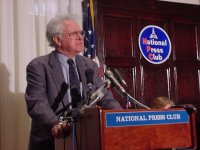Leaving the Civil Rights Establishment Behind
 If, like some readers, you haven't been convinced that there really is any substantial disagreement among progressive advocates about NCLB, this week's Samuel Freedman column in the NYT makes the case pretty vividly.
If, like some readers, you haven't been convinced that there really is any substantial disagreement among progressive advocates about NCLB, this week's Samuel Freedman column in the NYT makes the case pretty vividly.What Freedman leaves out about Taylor and the civil rights groups is even more important.
READ MORE>>
In the column (Parting Liberal Waters Over NCLB), Freedman profiles the broken friendships and "intellectual gridlock" that has shaped up over NCLB between pragmatic-minded civil rights icon Bill Taylor and much of the liberal left.
Taylor, a longtime civil rights advocate and desegregation champion, scorns others' calls for larger societal fixes like universal health care and school integration as a replacement or precondition for NCLB's higher standards and parental choice -- despite the fact that some of the most vocal critics of NCLB like Gary Orfield are former comrades in arms.
In addition to highlighting Taylor's gamble, the column also reminds those of us who may have forgotten that it's now been 30 years since the Supreme Court overturned involuntary regional school desegregation orders that would be the only realistic way to integrate urban school districts.
What the Times profile doesn't make entirely clear, however, is just what sacrifices Taylor has taken for his beliefs, just how easy it would have been for him join the anti-NCLB bandwagon and rest on his laurels, and -- perhaps most important -- just how amazingly silent most other civil rights organizations have been about NCLB and the process that led to its creation.
In the current environment, folks like Orfield and Kozol seem to carry the mantle for civil rights. But where does that leave everyone else?
Asleep at the wheel, internally conflicted, or blindly following Democratic political imperatives.
This division has been noted before:
EdWeek's Karla Scoon Reid noted internal divisions among civil rights advocates last summer, pointing out that some groups -- the Education Trust, NCLR, and Taylor's CCCR -- had split off from the rest of the pac and joined a new pro-standards organization, while most -- including LULAC, the NAACP -- had joined the NEA and FairTest in opposition to the law.
In July, the USAT's Richard Whitmire took note of the missing response from civil rights advocates like Orfield to the release of the national NAEP figures, which were generally up.
And the WSJ noted that it was Taylor's organization that responded to the threat of a lawsuit from Connecticut. At one point, Taylor considered filing a countersuit against the state for failing to educate its poor and minority children.
When the law was first created, many noted that it took its name from the CDF tag line, "leave no child behind." What few noted at the time was that the CDF had been dormant for nearly a decade on education issues and, having pretty much left the field, was helpless to do much about it.
This context makes Taylor's stance all the more notable. I've seen him go to bat for the NCLB several times over the past few years. He knows going in that he's not going to make any friends or win many converts on panels and among audiences that are usually stacked against him. Right or wrong, it's pretty impressive.

1 Comments:
Bill Taylor's activism is certainly impressive, as is his record and legacy. Still, he has not adequately finessed the line between being a "pragmatic" school reform advocate and an apologist for the big bark and no bite of NCLB. If he really wants to stake his legacy on something that will change schools, then he needs to get cozy with Mike Rebell [of the Campaign for Fiscal Equity]. At present, his blending of wishful thinking masked as civil rights does little good to his good name, nor the students he is attempting to serve. In fact, it does some harm to the kids who need financial resources, that will not be forthcoming under NCLB, as much as they need high expectations.
Post a Comment
<< Home